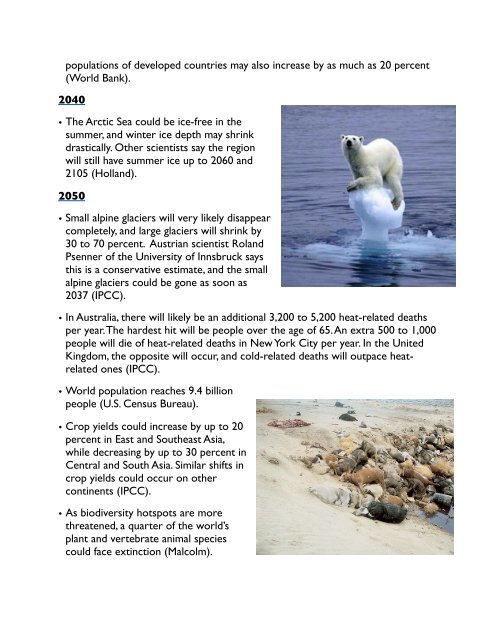The Skriker Actor Packet
The Skriker Actor Packet
The Skriker Actor Packet
Create successful ePaper yourself
Turn your PDF publications into a flip-book with our unique Google optimized e-Paper software.
populations of developed countries may also increase by as much as 20 percent<br />
(World Bank).<br />
2040<br />
• <strong>The</strong> Arctic Sea could be ice-free in the<br />
summer, and winter ice depth may shrink<br />
drastically. Other scientists say the region<br />
will still have summer ice up to 2060 and<br />
2105 (Holland).<br />
2050<br />
• Small alpine glaciers will very likely disappear<br />
completely, and large glaciers will shrink by<br />
30 to 70 percent. Austrian scientist Roland<br />
Psenner of the University of Innsbruck says<br />
this is a conservative estimate, and the small<br />
alpine glaciers could be gone as soon as<br />
2037 (IPCC).<br />
• In Australia, there will likely be an additional 3,200 to 5,200 heat-related deaths<br />
per year. <strong>The</strong> hardest hit will be people over the age of 65. An extra 500 to 1,000<br />
people will die of heat-related deaths in New York City per year. In the United<br />
Kingdom, the opposite will occur, and cold-related deaths will outpace heatrelated<br />
ones (IPCC).<br />
• World population reaches 9.4 billion<br />
people (U.S. Census Bureau).<br />
• Crop yields could increase by up to 20<br />
percent in East and Southeast Asia,<br />
while decreasing by up to 30 percent in<br />
Central and South Asia. Similar shifts in<br />
crop yields could occur on other<br />
continents (IPCC).<br />
• As biodiversity hotspots are more<br />
threatened, a quarter of the world’s<br />
plant and vertebrate animal species<br />
could face extinction (Malcolm).



